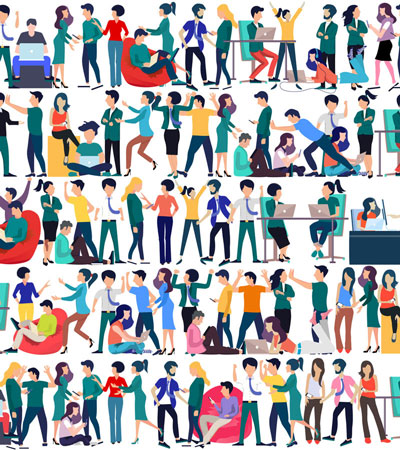In this article, we will look at the problem of helping people to help themselves. Are we reaching this goal and if not, why is that? We can not simply keep helping people externally. This causes a situation where people never escape the condition of need. So how do we fix this?
Is it working?
This article is not intended for circumstances where someone needs emergency help in whatever form. We are not talking here about giving someone food, counselling or accommodation for a limited time to help them over a difficulty. This will always be problem in our world (Jn. 16:33; Mat. 26:11). Helping those in need is a continuous responsibility we will always have in this life and it is never to be ignored (Gal. 6:2; Heb. 13:6). In this article, we are more concerned with those cases where someone seems to constantly be in need. Cases where you are continually helping someone and they seem unable to change to start being self-sufficient.
If we are truly going to help people, we as Helpers need to become redundant at some point to the need of the individuals and groups we are assisting. If we never reach this point, we may rightly ask whether we are being effective. The goal should be to help people help themselves. The old adage to rather teach a man to fish, than to keep giving him fishes applies. This is a much more difficult and profound task than simply giving food for example, invaluable as that is. However, for this to be achieved, we need real cooperation from those being helped.
Ellerman and Hirschman (Ellerman and Hirschman 2009, 2) states the following: ‘… genuine help is not something that can be done in a direct frontal way or mounted like an engineering project. You cannot force a person to act spontaneously. You cannot externally supply motivation to a person to act on his or her own motivation. This is often indicated with metaphors like “pushing on a string” or “you can lead a horse to water but cannot make him drink.”’.
As Helpers, we supply external reasons for people to work towards their own benefit. This will not be as effective as internal reasons and motivations. Helpees might go through the motions as it were, but the moment the Helper withdraws, they fall back into the same old pattern.
Ellerman calls this the conundrum we are faced with. Helpees do not help themselves without the input of Helpers in some way. Helpers need to intervene, but when they do, Helpees do not help themselves, but rather rely on others. Ellerman argues that the goal is to enable development and not control outcomes. In this there is a problem for Helpers though.
If we do not start addressing the more basic problem in everyone’s lives, we are doomed to fail.
Helping organisations are typically measured by how much they give in physical terms, not in enabling terms. It is easier to show how much food had been delivered to a community, than it is to prove enabling strategies like teaching communities to farm. This, of course, has an impact on an organisation’s image, unless very skilful arguments can be delivered effectively to donors and real result reporting might be delayed for some time.
Ellerman quotes Thomas Dichter (Dichter 2003) in saying the indirect approaches to helping is the best form of creating a self-development environment. We need to be ‘stimulating, fostering, convincing—rather than doing things directly’.
As mentioned, these ideas should not lead us to abandon direct help in the form of supplying immediate and critical aid. However, we should understand that this is not a long-term solution for allowing people to be self-sufficient.
Questions we might ask ourselves include the following. Are the number of people I are helping increasing or decreasing without other external factors being responsible? Am I helping the same able-bodied people continuously? What are the reasons for this? What can be done about that?
Whatever our helping speciality, we must critically evaluate whether our work is making a real difference in people’s lives. We must measure our progress. Glicken (Glicken 2005, 3) puts it as follows: ‘The current practice in psychotherapy, counselling, and in much of our work as helping professionals, too often relies on clinical wisdom with little evidence that what we do actually works. Clinical wisdom is often used as a justifica¬tion for beliefs and values that bond us together as professionals but that often fail to serve clients. Many of those beliefs and values, although com¬forting, may also be inherently incorrect.’
The Underlying Problem and Base Solution
As Christians, we understand that there is an underlying reason for all suffering, lack, pain and death. It is an underlying issue true for all humankind and all creation in fact. Secular ideas such as the ones above can only go so far in explaining practicalities, but it cannot solve the basic issue. No man can.
Christianity states that all humans have an inherent sin problem. All suffering stems from this. God created the world perfectly. No lack, no poverty, no illness, no hate, no death. So how did the world get so broken? Sin entered the world through the rebellion and fall of man (Gen. 3). Because of sin and God’s judgment over it, we are in a broken world and we as Helpers are needed and as long as this world continues, this will not fundamentally change.
So, what can be done? Specifically, when it comes to people in need and getting them to a place of more permanent enablement, we need solutions. Considering the above-mentioned principles, there are many things we can do to entice people to be change, but it will mostly fruitless if we do not first address this more basic problem – the fallenness of all human beings.

God Himself provides the solution and He had this in mind right from the start (Gen. 3:15). God Himself in Jesus Christ provides the solution for sin. He died for all our sins and we become beneficiaries of this grace when we receive Him in faith (Jn 3:16; Col. 2:13-14; Rom. 3:21-26). This is the Base Solution that pre-empts any real long-term change in anyone’s predicament.
To be clear, this is not an endorsement of the Prosperity Gospel which subverts the true gospel of Jesus Christ. We are saved and we do not have faith in order to be prosperous. That is a lie. When we are at peace with God, we are, through His strength and enablement, capable of handling any adversity. Not only that, but we can even flourish in such circumstances. We may then become part of a solution for others. People who give rather than receive as a baseline form of existence.
When someone is saved, a process of sanctification starts through the power of the Holy Spirit that moves the person out of state of spiritual depravity to righteousness. This will inevitably spill out into physical reality.
This then is the start of any real and lasting change and this is where our help should always be based, namely the honest proclamation of the gospel of Christ. When this is in place, everything else will flow from this. In this way we can truly help. This is the real and best ‘indirect approach’. God gives us a free will. He is the solution, but He does not force Himself on us. He does act indirectly as promoted above and leaves the decision to us.
In this way we can use the indirect method to stimulate change that will enable people to reach a point of self-help. This does not mean that we stop there, of course, but if we do not start there, we cannot expect any real long-term and community-wide results.
Conclusion
In this article we looked at the problem of getting people out of a situation of need. We saw that indirect incentives are more effective than continued direct support for this particular goal. We concluded however, that if we do not start be addressing the more basic problem in everyone’s lives, we are doomed to fail. It is only in Christ that any real solution for suffering and need can be addressed.
Works Cited
Dichter, Thomas W. 2003. Despite Good Intentions: Why Development Assistance to the Third World Has Failed. First edition. Amherst: University of Massachusetts Press.
Ellerman, David, and Albert O. Hirschman. 2009. Helping People Help Themselves: From the World Bank to an Alternative Philosophy of Development Assistance. University of Michigan Press.
Glicken, Morley D. 2005. Improving the Effectiveness of the Helping Professions: An Evidence-Based Approach to Practice. Thousand Oaks: Sage Publication.




